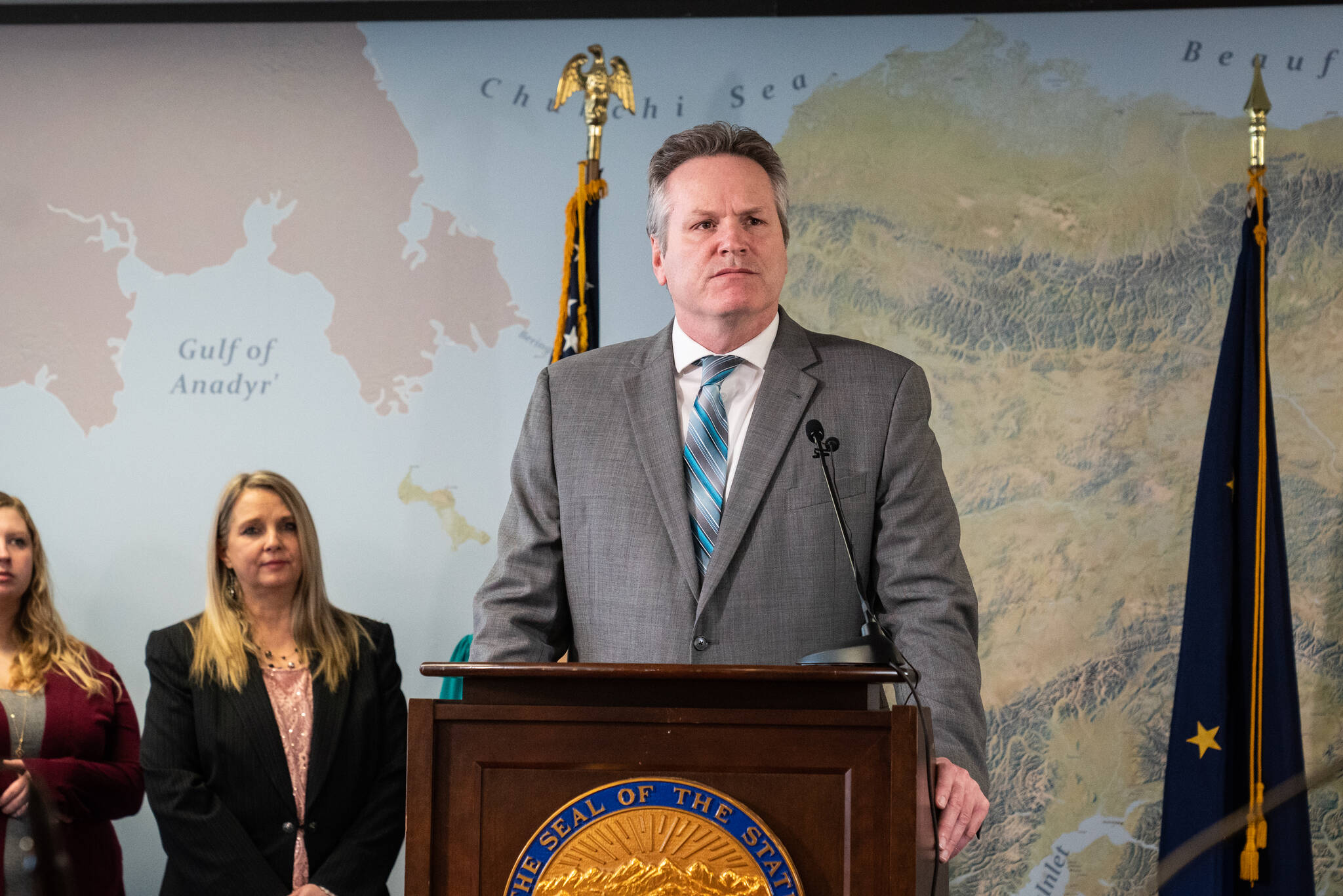Gov. Mike Dunleavy unveiled three pieces of legislation last Friday that are part of his “People First Initiative” aimed at addressing public safety issues in Alaska. The bills, announced by Dunleavy during a Friday press conference, are specifically targeted toward sex trafficking, victim protection and sex offenses.
That initiative — first announced by Dunleavy last year — also focuses on missing and murdered Indigenous persons, as well as foster care and homelessness. First proposed as an omnibus bill, the proposals outlined Friday are divided into three bills that will go to the Alaska Legislature.
“These bills are designed to give our law enforcement and our prosecutors the tools they need, and give victims the protection and the justice they deserve,” Dunleavy said.
Dunleavy was joined Friday by Attorney General John Skidmore, who outlined the ways the three bills would change the state’s existing statutes.
Sex trafficking
The sex trafficking bill, Skidmore said, addresses sex trafficking from the supply, demand and victim sides. As it relates to the supply, the bill would outline different classes of felonies for sex and human trafficking. Currently, the two types of trafficking are not differentiated in state statute.
Addressing the demand side of sex trafficking, the bill would also create a new crime, called the patron of a victim of sex trafficking. Under the change, a person who purchases sex from another person would be deemed reckless to the fact that the victim is a victim and subject to higher penalties, Skidmore said.
The bill would also give individuals convicted of prostitution the opportunity to expunge their record if they can prove they were the victims of sex trafficking at the time they were convicted.
“They should not be unfairly tagged with a conviction if they themselves were the victim of the crime,” Skidmore said.
Protecting victims
A separate bill aims to protect victims of crime in Alaska in new ways. First, it would require people under the jurisdiction of the Department of Correction or who have to register as a sex offender with the Department of Public Safety to file a petition in order to change their name. Skidmore said that provision is intended to allow victims to keep track of their perpetrators even if they don’t recognize the perpetrator’s name.
The same bill would allow a key witness or prosecuting officer to summarize evidence or testimony in a case when testifying before a grand jury without requiring victims to retell their story. The change parallels processes in 32 other states as well as at the federal level, Skidmore said, and will make Alaska’s justice system more efficient.
“Think of the most traumatic experience that you’ve had in your life,” Skidmore said Friday. “Think about having to describe it to other people. Now think about having to describe it to other people repeatedly, again and again and again. We’re seeking to make the system less traumatic to victims because they deserve that.”
Sex offenses
The last bill announced Friday would address sex offenses. Skidmore said the bill amends the crime of harassment in a way meant to fill gaps in current statute. It is currently not a crime, for example, to grab a person’s genitals on the street unless force was used, Skidmore said. The bill would make doing so a class C felony for sexual contact even if force was not used.
The same bill would also update Alaska’s sex offender registry by creating additional categories for offenses, such as sending explicit pictures of minors and misconduct involving corpses, Skidmore said. Anyone convicted of possessing or distributing child pornography who holds a teaching certificate would have that certificate permanently revoked under the proposed bill.
Dunleavy said Friday the three bills will be introduced to the legislature — currently in session — by the Alaska Department of Law and that he thinks “a number of” lawmakers will support the initiatives.
“I think more than anything, this is a moral imperative for all of us to really support the changes that we’re talking about,” Dunleavy said.
More information about the People First Initiative can be found on the governor’s website at gov.alaska.gov.
Reach reporter Ashlyn O’Hara at ashlyn.ohara@peninsulaclarion.com.


